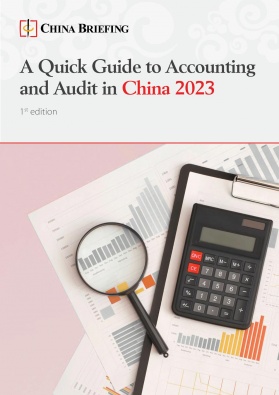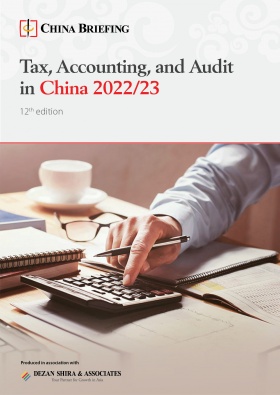Is China Urging SOEs to Phase Out ‘Big Four’?
It was reported that China is pushing for state-owned enterprises (SOEs) to switch to local Chinese or Hong Kong-based accountants instead of relying on the Big Four, given data risk and potential cyberattacks-related concerns. State media close to the government, however, have refuted the claim, while highlighting recent engagements between Chinese SOEs and the Big Four. We discuss the latest developments in China’s auditing and accounting sector and review the market’s key features.
Beijing’s rumored push for state-owned enterprises (SOEs) to switch to local Chinese or Hong Kong-based accountants rather than relying on the Big Four (PwC, Deloitte, KPMG, and EY) has made international headlines in the past week. The move was reported to be driven by concerns about data risk and potential cyberattacks that could compromise national security.
However, Chinese state media outlets have refuted the news, citing concrete examples of SOEs recently signing contracts with the Big Four. That said, it may take awhile before global stakeholders are convinced that Chinas SOEs have not been asked to only opt for domestic auditing firms.
What happened
China was reported to have urged its SOEs to stop using the Big Four auditing firms due to concerns about data risk. The guidance to switch to smaller audit firms was said to come from the State-owned Assets Supervision and Administration Commission (SASAC), which oversees China’s SOEs. The move is believed to be driven by concerns that the large amounts of sensitive data handled by the Big Four in their audits of SOEs may be vulnerable to cyberattacks or data breaches that could compromise national security.
Bloomberg reporting suggested that the move could also be part of a broader push by the Chinese government to reduce the country’s reliance on foreign companies in strategic industries. In fact, the Big Four are all foreign-headquartered firms, and China has been working to promote the growth of domestic audit firms in recent years. However, the Big Four have a significant presence in China and are deeply entrenched in the country’s business ecosystem, which in any case would make it challenging for SOEs to completely sever ties with them.
Potential impact for the auditing sector
The impact of China’s potential move to encourage state-owned enterprises to switch to Chinese or Hong Kong-based firms will depend on a number of factors, including how widely the guidance is adopted and how it is implemented.
But generally, it is likely to have significant implications for the Big Four and their operations in China. If more SOEs switch to domestic firms, it could reduce the Big Four’s market share in China and potentially limit their ability to expand their operations in the country, which could also have implications for companies that rely on the Big Four for auditing and other services.
On the other hand, if the news turns out to be true, local Chinese auditing firms or Hong Kong-based auditing firms will be able to compete for a bigger share of the market. It might be a wise move for relevant firms to prepare themselves for the potential opportunity.
Will it affect foreign businesses?
The potential move to encourage SOEs to switch to domestic firms could have significant implications for foreign businesses and investors operating in China. It suggests that the Chinese government is taking a more assertive approach to regulating foreign companies operating in strategic industries, which could lead to increased scrutiny and potential restrictions on their activities.
This is particularly significant in light of the concerns about data risk, which could impact any foreign company that handles sensitive data in China.
In addition, there is growing competition between foreign and domestic firms in China, particularly in industries that are seen as strategic by the government. This competition could lead to new challenges for foreign companies that rely on the Big Four for auditing and other services, as they may face increased government scrutiny than their domestic counterparts.
Chinese media publish that claims are false
On February 24, 2023, the Global Times published an article discussing the recent claims that China’s SOEs were being urged to phase out using the Big Four accounting firms. The article refuted these claims and cited recent successful bids of the Big Four to provide accounting services to China’s SOEs.
In addition, since 2012, the Big Four have become localized enterprises in China, and the Chinese government has already issued guidelines to ensure that accounting firms protect the commercial secrets of audited SOEs and safeguard national financial information security.
China’s auditing, accounting, and tax services industry
As the world’s second-largest economy, China is home to some of the largest accounting and auditing firms in the world. The audit, accounting, and professional services sector in China has grown significantly in recent years, and the industry’s demand is expected to continue to increase.
The auditing, accounting, and professional services industry in China is projected to achieve a market size of US$16.4 billion in 2023, with a five percent growth rate compared to the previous year. The industry has grown by 5.5 percent on average since 2018. This growth is attributed to the increasing demand for accounting and auditing services from both domestic and foreign companies operating in China.
According to the Chinese Institute of Certified Public Accountants (CICPA), by the end of July 2021, there were 111,000 practicing certified public accountants and 8,782 accounting firms registered in the country, and the annual business income of the industry exceeded RMB 100 billion (US$14.35 billion).
Market share and the role of the Big Four
The Big Four accounting firms are among the largest players in the Chinese accounting, audit, and professional service sector, accounting for around 20 percent of the total market share. However, domestic firms have also established a significant presence, with Zhongxinghui and ShineWing among the largest local firms.
In addition to the Big Four and local firms, mid-tier and smaller firms are also competing in the market. Furthermore, there is an increasing presence of technology companies that offer accounting and financial management services, such as Alibaba’s Ant Group.
The Big Four have established a significant presence in China and have reported steady growth in recent years. In 2020, Deloitte China reported a revenue of RMB 18.8 billion (US$2.9 billion), while PwC China reported a revenue of RMB 20.6 billion (US$3.2 billion). EY China and KPMG China reported revenues of RMB 16.7 billion (US$2.6 billion) and RMB 11.9 billion (US$1.8 billion), respectively.
Indeed, the growth of these firms reflects the increasing demand for audit, accounting, and professional services in China, jointly driven by the growth of Chinese companies and the expansion of international businesses into the Chinese market.
About Us
China Briefing is written and produced by Dezan Shira & Associates. The practice assists foreign investors into China and has done so since 1992 through offices in Beijing, Tianjin, Dalian, Qingdao, Shanghai, Hangzhou, Ningbo, Suzhou, Guangzhou, Dongguan, Zhongshan, Shenzhen, and Hong Kong. Please contact the firm for assistance in China at china@dezshira.com.
Dezan Shira & Associates has offices in Vietnam, Indonesia, Singapore, United States, Germany, Italy, India, and Russia, in addition to our trade research facilities along the Belt & Road Initiative. We also have partner firms assisting foreign investors in The Philippines, Malaysia, Thailand, Bangladesh.
- Previous Article New Rules to Facilitate Overseas IPOs for Chinese Companies
- Next Article Belt And Road Weekly Investor Intelligence #122







